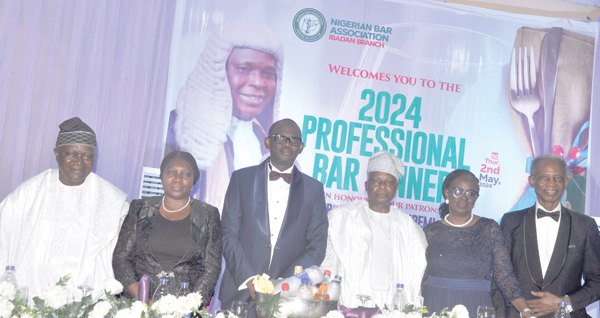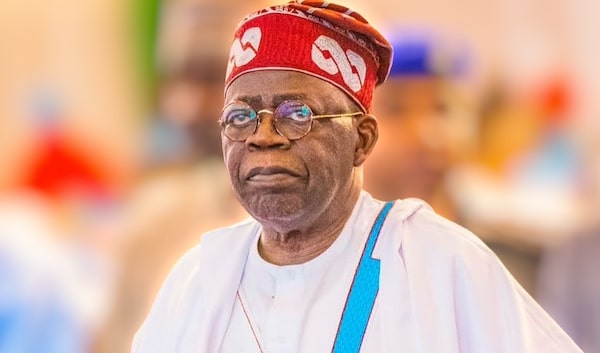Last week, the Nigerian Bar Association, Ibadan branch, held a professional dinner in honour of the Attorney General of the Federation and Minister of Justice, Prince Lateef Fagbemi (SAN). A thought-provoking after-dinner speech followed. YEJIDE GBENGA-OGUNDARE details the ills plaguing the justice sector as dissected by its front-row members at the dinner.
The Attorney General and Commissioner for Justice in Ogun State, Oluwasina Ogungbade (SAN), has lent his voce to calls for an urgent overhaul of the Nigerian criminal justice system in order for it to avoid a collapse.
He made the call while delivering the after-dinner speech during a professional dinner held in honour of the Attorney General of the Federation and Minister of Justice, Prince Lateef Fagbemi (SAN) by the Nigerian Bar Association, Ibadan branch, held last week at the Aare Afe Babalola Bar Centre, Iyaganku, Ibadan.
“Let us leave with the knowledge that this sector cannot survive much longer or function impactfully if we do not rejig it. A lot must be done to retool the judiciary and equip them for efficient justice delivery” he rallied the gathering.
The Silk stated that criminal justice is a subject he is passionate about because its successful administration is integral to the maintenance of social order, adding that if the powers of an Attorney-General and the constitutional latitude that he enjoys with the court’s protection is examined, it can be deduced that the framers of the constitution and the originators of the legal system intended for Attorneys-General to pay special attention to criminal justice.
“The purpose of the criminal justice system is to protect society, punish offenders, rehabilitate criminals, prevent the commission of other crimes, and provide support for the victims.
“Every institution has individual roles to play for the realisation of an effective criminal justice system. For instance, the role of police officers is to arrest criminals and carry out investigations, the roles of lawyers is to aid such accused persons in the exercise of their right to be heard in court and finally the role of the court is to ensure that such accused persons receive fair trials in the determination of their guilt or innocence.
“After a conviction, other participants in the criminal justice system such as the correctional services also have roles to play,” he said.
Speaking on the challenges facing the criminal justice system in Nigeria, Ogungbade said while it is important to uphold criminal justice at all times, there are factors that can frustrate this commitment to uphold it always, from poor funding, to bad structure of the courts, political interference, inefficient investigation and unprofessional prosecution amongst other issues.
“There are also other structural issues that undermine even the individual drive and commitment of stakeholders. These include insecurity, inability to guarantee the safety of justice sector stakeholders, poor remuneration of judges and many more. I will devote some attention today, to the expectations we have of the judiciary, which in my view, will be undue, for as long as we retain the judiciary in its current form” he noted.
Making of a fearless judge
The keynote speaker pointed out that “As an example, judicial officers are expected to be fearless, they are expected to be bold in the face of insecurities and be able to walk away from situations that may offend their sense of justice or commitment to virtue.
“However, I often wonder – when a judge compares the wave of challenges against the possibilities available, will he be fearless or fearful?
“As is widely acknowledged, the remuneration of judges in Nigeria today is a disincentive for dedicated service or even service at all. The statute regulating the remuneration of judicial officers in Nigeria was enacted as far back as 2008 and while the Nigerian economy has changed massively in the time since, that statute has not changed, and Their Lordships’ remuneration has not bettered. This can cause both judicial officers presently in service and those that aspire to the Bench to be discouraged.
“So, how dedicated will a judge be with a huge volume of work and yet so little pay? How much will he drive himself to conclude matters? How many matters would he be willing to accommodate into one day, when he knows that his salary may not even afford quality private medical care, if he breaks down? We must also consider whether a judge can stay true to the financial regulations of judicial office if his remuneration is perennially poor. Poor pay may encourage a judge to dabble into moneymaking ventures which are not in themselves corrupt, but are forbidden for judges, in the interest of preserving their impartiality.
“In this regard, we all must commend Prince Lateef Fagbemi SAN for his efforts and continuous contributions towards improving the remuneration of judicial officers through the proposed amendment to the salary structure of judges. The proposed amendments have been subjected to a wide range of opinions but what all commentators agree on is that an increment is welcome – even overdue – and that this proposal is a good step in the right direction,” he reiterated.
Retirement blues
Ogungbade also raised the issue of post-service reality of Nigerian judges, adding that currently, once a person becomes a judge and retires that is the end of practice for such a person, which can brew uncertainty in the mind of aspirant to the bench.
Section 292(2) of the constitution, currently bars all former judicial officers from appearing before a court or tribunal.
Rule 6(4) of the Rules of Professional Conduct bars former judges from even signing processes.
Ogungbade believes the ban is unrealistic in the face of the current realities.
He said, “Thus, a judge who retires at the relatively middle age of 60 or 65 and who may live for another 20, 25 or 30 years, is barred for life from returning to practice.
“By contrast, his colleagues who stay in the Bar, practice well into their 70s and even 80s, becoming household names and leaders of the profession.
“The justifications for allowing former judges to return to practice are many. Firstly, the job of a judge is characterised by a near-total absence of job security and judges have, over the years, been victims of harsh administrative decisions of different political structures, particularly during the military era.
“In addition, judges are constantly vulnerable to the fear of unfair or unjust dismissal and the realisation of economic woe which may befall them since they will not be able to practice post-dismissal.
“We may all recall the recent example of a judge who was sanctioned in one of the states, for complaining about unpaid salaries – a complaint that professionals and employees in other fields make without punishment.
“Secondly, the complete mutual exclusivity of the Bench and Bar has made the Bench a path of no return. The system of checks and balance was designed to keep the arms of government coequal and accountable. However, when abused, checks and balances can be and have been used to deny judicial officers appointments or promotions; purely for political reasons and a Nigerian judge has no choice but to bear it.
“He cannot resign in protest because aside the symbolic effect of his resignation, he will achieve nothing else, and cannot return to practice. When faced with a scenario that justifies a principled resignation, he will find himself between a rock and a hard place – unwilling to persist in an inconvenient system, and unable to leave.
“Today, any judge that leaves judicial office, voluntarily or involuntarily, is condemned to either uncertainty or certain isolation. For this reason, it takes uncommon courage to act impartially and fearlessly, which a judge must do.
“In my view, a judge who knows that he can return to practice even if he is unfairly dismissed from judicial service or forced to exit voluntarily will be less fearful about the future and more fearless when adjudicating. Today, we see the unfortunate occurrence where retired judges do not get their dues as due or when due. Some even have to sue and come before current judges who also will retire one day.
“One can only imagine how those serving judges feel when they preside over such matters. They see the bleak future ahead of them and are discouraged or worse, tempted,” he emphasised.
Theoretical ethics
The AG further said that legal practitioners cannot also be absolved from the abuse the criminal justice is subjected, as sometimes; they encourage clients to bring a matter which does not necessarily have to be a subject of litigation to court just so they can earn fees, adding that “lawyers criminalise disputes and even advise the police on how to maximise the oppressive impact of the charges filed”.
He added, “Sometimes, clients come to report purely civil disputes and transactions, and seek civil remedies but most unfortunately, our colleagues discourage them from seeking civil remedies and tell them that they can instead get more value and effect from inventing a crime out of the dispute.”
He further noted that the abuse of the system is not limited to criminal matters but pervades all spheres of the legal system, particularly in relation to what he called the dwindling observance to the Rules of Professional Conduct.
“I know as a fact that the Ethics of the Profession are still taught at the Nigerian Law School. Yet, on a yearly basis, we produce lawyers who as soon as they are called to the Bar, appear to have forgotten all they were taught. In my estimation, the reason is simple. New lawyers join the bar and immediately follow or emulate what they find their seniors to be engaged in, even when those seniors are engaged in conducts that are clearly unprofessional.
“This is particularly more so when in their view, those seniors appear to be the better for it professionally and financially. So, as we dine and wine, we must ponder these issues and determine whether we are not ourselves, our own worst enemies?”
He also spoke on sexual abuse issues in the society, reiterating that “I owe a duty as a Nigerian and a father to draw collective attention to rising cases of sexual abuse in our society, especially of minors. The data may show that girls are more at risk but the evidence shows that it cuts across genders.
“Recently, there was a case where a father sodomised his five-year-old son to death, and then hurriedly buried the boy. Another man recently abused his nine-month-old daughter. Society must rise against this trend, and my experience tells me that it is better to prevent these incidents from occurring than to react after the fact by the arrest and prosecution of the perpetrators. The longest terms of imprisonment may do little to assuage the lifetime of psychological and emotional trauma that victims are often subjected to.”
Shaped by Ibadan Bar
He explained that he was pleased to enjoy the opportunity of partaking in “this important feature of our profession. I am also very glad to have been chosen to give this after dinner speech today, for three reasons. First, Prince Fagbemi played a part – even though unknown to him – in my decision to make a success out of my career.
“Second, the decision to hold the dinner in his honour and to invite me to deliver the after-dinner speech is a confirmation of how Ibadan Bar contributes to the profession around Nigeria and holds on to its Diaspora members. As we all know, Prince Fagbemi is now in Abuja, and I am now in Abeokuta. Yet, as this Bar marks this important occasion, it gives place and prominence to us, its exports. Although I did not start my career in Ibadan Bar, Ibadan Bar has shaped me and by this invitation, Ibadan Bar has confirmed to me that it views me and accepts me as a member of the Ibadan Family.
“Third, this kind of gathering allows us to touch base on pain points in the legal profession and speak frankly to ourselves on challenges in the justice sector which, regardless of our callings, interests, employments or practice areas, is our sector,” he added.
Fagbemi, the activist
Speaking about Fagbemi, he noted that the AGF has made significant and indelible contributions to the development of the legal profession through many means, particularly through courtroom advocacy, adding that his current assignment as AGF is only the latest frontier.
“It is a befitting one. The trajectory of Prince Fagbemi’s career as a lawyer attests to the fact that he is a person destined for greatness.
“His career over the past four decades is responsible for several monumental decisions that are today a touchstone of our jurisprudence, enunciating principles that were previously unclear, such as the principle of wasted votes set out in Ejiogu v. Irona (2009) 4.NWLR (Pt. 1132) 513.
“In at least one instance – the case of Amaechi v. INEC (2008) LPELR-446(SC) – Prince Fagbemi created a unique precedent and achieved a feat that no other lawyer can replicate. Little wonder, his nomination as a minister was well received across the profession.
“During his screening by the Senate in Abuja, Prince Lateef Fagbemi SAN characteristically manifested both his brilliance and passion for reformed social order when he recommended the unbundling and merger of law enforcement agencies such as the Economic and Financial Commission, (EFCC) and the Independent Corrupt Practices and Other Related Offences Commission (ICPC) to foster enhanced efficiency. Those recommendations are in the works today.
“By way of another example; we should recall that he had also once called for enactment of a new law that would reduce political parties in the country to a maximum of six. He made this recommendation at the national workshop on ‘Election Petition Review’, organised by the Court of Appeal in collaboration with International Foundation on Electoral System (IFES), which held in Abuja in April 2021.” he lauded.




